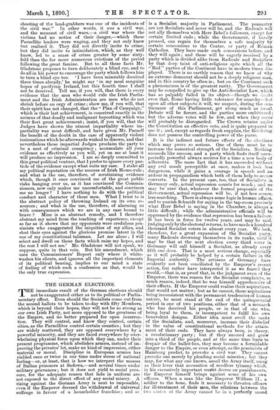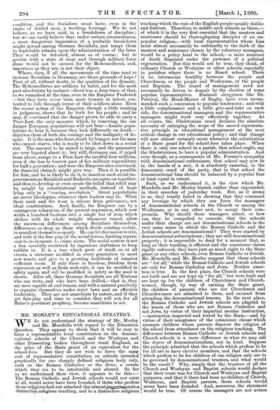THE GERMAN ELECTIONS.
feeling—or, at least, that is how we interpret the masses of Italian prisoners at Sadowa,—and several times under military grievances ; but it does not yield to social pres- sure, for the adequate reason that lads in uniform are not exposed to the direct effect of any social misery. A rising against the German Army is next to impossible, even if the Emperor decreed the withdrawal of universal suffrage in favour of a householder franchise ; and so is a Socialist majority in Parliament. The peasantry are not Socialists and never will be, and the Radicals will not ally themselves with Herr Bebel's followers, except for certain limited ends ; while the Government, if hardly pressed, can regain for themselves a safe majority by certain concessions to the Centre, or party of Roman Catholics. They have made such concessions before, and they will again ; and these will be eagerly received by a party which is divided alike from Radicals and Socialists by that deep taint of anti-religious spite which all the " Red " parties of the Continent have in modern times dis- played. There is no earthly reason that we know of why an extreme democrat should not be a deeply religious man, and in this country he often is ; but on the Continent such a phenomenon is of the greatest rarity. The Government may be compelled to give up the Anti-Socialist Law, which has so palpably failed in its object—though we doubt even that, Rome having little tolerance for anarchy—but upon all other subjects it will, we suspect, during the con- tinuance of this Parliament, get along much as usual. Debate will be fiercer, and the parties more embittered ; but the adverse votes will be few, and when they occur will probably be disregarded. The Crown retains under the Constitution an effective veto, and is quite prepared to use it ; and, except as regards fresh supplies, the Reichstag does not possess the controlling power of the purse.
It is the indirect and future effects of the elections which may prove so serious. One of them must be to increase the numerical strength of the Socialists. Nothing succeeds like success, and a party which finds itself unex- pectedly powerful always secures for a time a new body of adherents. The mere fact that it has succeeded without any evil result perceptible at once, makes it look less dangerous, while it gains a courage in speech and an ardour in propagandism which both of them help to secure converts. In the present case, too, that of Socialists in Germany only, actual repression counts for much ; and we may be sure that, whatever the formal proposals of the Government, actual repression will be, if not less severe, less searching. There is always some logic in human affairs, and to punish Schmidt for saying in the tap-room precisely what Herr Bebel is saying in the Chamber, is always a little difficult ; while the administrative officials will be oppressed by the evidence that repression has been a failure. It has been in force for twelve years, and may be said, judging onlyby the electoral returns, to have made a hundred thousand Socialist voters in almost every year. We look, therefore, for a great expansion of the Socialist party, many Radicals drowning themselves in its ranks, until it may be that at the next election every third voter in Germany will call himself a Socialist, as already every fifth one does. That is a most serious change, especially as it will probably be helped by a certain failure in the Imperial authority. The artisans of Germany have evidently not been conciliated by the Emperor's recent action, but rather have interpreted it as we feared they would,—that is, as proof that, in the judgment even of the Emperor, there was reason for the Socialist complaints, so much reason, indeed, that he was himself apprehensive of their effects. If the Emperor could realise their aspirations, that would not matter; but as he cannot, those aspirations being inconsistent with the permanent tendencies of human nature, he must stand at the end of the quinquennial period in one of two positions, either that of a monarch who has deceived his people, or in that of one who, being loyal to them, is incompetent to fulfil his own benevolent designs. Either idea must swell the ranks of the Socialists, and, moreover, increase their disbelief in the value of constitutional methods for the attain- ment of their ends. They have always been, in theory, a revolutionary party; but if they succeed and grow into a third of the people, and at the same time learn to despair of the ballot-box, they may become a formidable danger to the Empire, or even attempt, as the pessimists of Hamburg predict, to provoke a civil war. They cannot provoke one merely by pleading social miseries ; but they may, for what any one knows, assail the Army itself, using as their lever that accusation of ,needless tyranny which, in his excessively important reethit decree on punishments, the Emperor himself brings against some of his own officers. When a man like the Emperor William II., a soldier to the bone, finds it necessary to threaten officers for ill-treatment of their men, the relations between the two castes of the Army cannot be in a perfectly sound condition, and the Socialists must have, even in the ranks of drilled men, a working leverage. We do not believe, as we have said, in a breakdown of discipline ; but we can easily believe that, under certain circumstances, a most dangerous impression of a probable breakdown might spread among German Socialists, and tempt them to deplorable attacks upon the administration of the laws. They would be defeated, almost as of course ; but to govern with a state of siege and through military force alone would not be success for the Hohenzollerns, and, imperious as they are, is not their object. Where, then, if all the movements of the time tend to increase Socialism in Germany, are there grounds of hope ? First of all, without doubt, in the qualities of the dynasty. The Hohenzollerns are soldiers by habit, and for the most part absolutists by instinct—there was a deep trace of that, as we remarked at the time, even in the Emperor Frederick —but they have never been mere tyrants in intent, con- tented to rule through terror of their soldiers alone. Even the recent action of the Emperor, though a little wanting in judgment, shows that he feels for his people ; and he may, if convinced that the danger grows, be able to carry a Poor-Law, the only measure which, by removing the one danger European populations will not bear—Asiatic popu- lations do bear it, because they look .differently on death— deprives them of both the courage and the malignity of de- spair. It is the man who fears death by hunger, not the man who cannot starve, who is ready to be shot down in a social riot. The amount to be raised is large, and the peasantry are very bigoted about it ; but still, Germany can, if urged from above, assign to a Poor-Law the needful four millions, even if she has to borrow part of her military expenditure for half a generation; and were the Emperor once convinced, the financial obstacle might give way. Then it is possible for him, and he is likely to do it, to sanction such social im- provements as Socialists and Radicals can agree on together, and thus re-develop or even create the belief that relief may 11 sought by constitutional methods, instead of hope lying only in a "roaring revolution." Great populations are never ideologues, whatever their leaders may be. What their rank and file want is release from grievances, not ideal constitutions. And, finally, the Emperor can by a courageous relaxation of the present repression, which now welds a hundred factions into a single bar of iron, which strikes with its whole weight whenever raised, allow the enormous differences among Socialists themselves, differences as deep as those which divide existing society, to manifest themselves openly. He can let discussion revive, and with it the free play of the social forces, limiting repres- sion to incitements to crime alone. The social system is not a box carefully contrived by ingenious craftsmen to keep rabbits in. It is a tree which grew of itself, or, at all events, a structure modified in every generation to meet new wants, and give to a growing multitude of inmates sufficient room. If only there is freedom, freedom from repression as well as from mob-rule, it can be modified in safety again, and will be modified in safety as the need is shown. After all, these German Socialists are all Teutons who can write, and who have been drilled,—that is, they are men capable of cool reason, and with a natural proclivity to organise themselves under strict laws and an effective leadership. They are not anarchists by nature, and if they get fair-play and time to consider, they will not, for all Heine's pessimist prophecy, become anarchists in act.







































 Previous page
Previous page